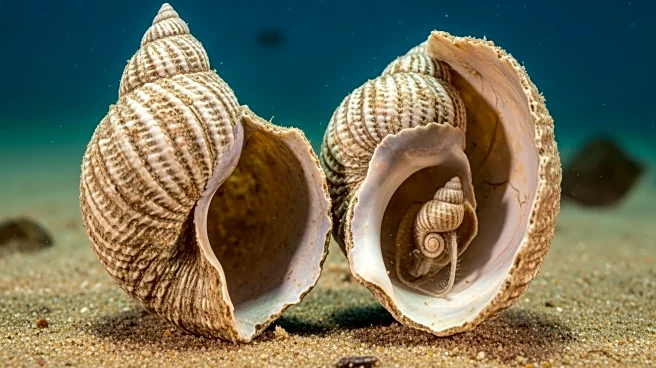What's Happening?
Research teams from Academia Sinica and National Taiwan University have made a groundbreaking discovery in the Early Pleistocene Tananwan Formation of northern Taiwan. They documented five freshwater mollusk
species, including the second known global fossil evidence of a juvenile snail shell preserved within its mother's shell. This rare find reveals ancient viviparous behavior, indicating live birth and nurturing in prehistoric snails. The study, published in Geodiversitas, highlights the oldest known freshwater fossil organisms in Taiwan, establishing biogeographical connections with East Asia. The Taiwan Strait land bridge played a crucial role during glacial periods as a migratory corridor for freshwater species, impacting species dispersal and evolution.
Why It's Important?
This discovery provides significant insights into Taiwan's freshwater paleontology, which has been predominantly marine. The research offers a vital baseline for comparison with modern freshwater ecosystems, currently threatened by human activities and invasive species. The findings underscore the importance of preserving these fragile natural systems. The study also advances understanding of Taiwan's Quaternary record, filling gaps in knowledge about freshwater biodiversity evolution in the western Pacific. By linking paleontology, stratigraphy, and island biogeography, the research addresses broader evolutionary and environmental questions, contributing to the understanding of species dispersal and ecological history.
What's Next?
The research sets a framework for reconstructing northern Taiwan's paleoecology, with implications for future studies on freshwater biodiversity and conservation efforts. The discovery of juvenile shells within adult Sinotaia quadrata provides rare insight into ancient reproductive strategies, prompting further investigation into viviparity among viviparids worldwide. The biogeographic interpretation suggests earlier faunal exchanges with continental East Asia, likely via recurrent Pleistocene land appearances. This work encourages continued exploration of Taiwan's fossil record to deepen understanding of evolutionary processes and environmental changes in the region.
Beyond the Headlines
The study highlights ethical considerations in preserving modern freshwater ecosystems, which are increasingly threatened by human destruction. It emphasizes the need for sustainable practices to protect biodiversity and maintain ecological balance. The research also contributes to cultural understanding of Taiwan's natural history, fostering appreciation for the island's unique geological and biological heritage. Long-term shifts in conservation policies may be influenced by these findings, promoting efforts to safeguard vulnerable ecosystems and species.








